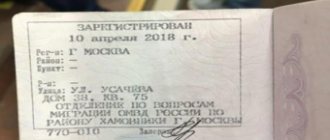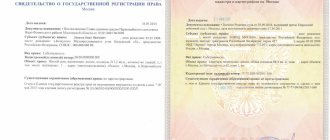The desire to register property as common shared ownership (CHP) most often arises in relation to residential real estate. Several people can privatize or buy housing, receive it as a gift or by inheritance. You can legally own a share in it and dispose of it only after registering your right in the Unified State Register (USRN).
To do this, you will need to provide documents confirming your right to a share and check the availability of real estate in the cadastre. But you always need to start by obtaining the consent of all potential owners. If someone is against dividing the common property into shares, only the court can help. There are a lot of nuances in registering real estate, which can sometimes only be taken into account with the help of lawyers.
What documents are needed to register common shared ownership?
Common shared property is property that is owned by everyone together, but with each person's share determined. A share can be real (for example, a part of a house or a room in an apartment), but more often it is ideal, that is, abstract. This part exists only on paper and is designated by a fraction: 1/2, 1/3. According to the Civil Code, the shares are equal, but by agreement they can be changed in any ratio. In controversial situations, the size of the parts is determined by the court.
Registration of real estate in Rosreestr involves registering your home and recording your right to it. Moreover, according to a simplified procedure, this can be done simultaneously. To register an ODS, three conditions must be met.
Firstly, it is necessary to obtain the consent of all future owners or obtain it through the court. In some cases, legal agreements can only be formalized by a notary. However, from July 31, 2019, after the entry into force of Federal Law No. 76 of May 1, 2019, the participation of a notary is no longer required for many transactions with shares.
Secondly, the property must be registered in the Unified State Register of Real Estate and assigned a unique number. If it is not there, you need to add it. There are definitely apartment buildings there, but the village or country house that you inherited may well not be there. Then you need to submit an application and call a cadastral engineer. Without registering real estate in the cadastral register, registration of rights to it is impossible.
Thirdly, you must have title documents. That is, those on the basis of which the right to register part of the housing as property arises (they are called just that - foundation documents). Which ones exactly depend on the method of acquisition. It could be:
- contract of sale;
- privatization agreement;
- deed of gift;
- will;
- court decision recognizing the right to real estate.
Common shared property can also be formed from joint property when it is divided into parts. This is possible by agreement of the owners (voluntarily or through the court) or by concluding a marriage contract if the property is shared by spouses.
Procedure for obtaining a share
First of all, it is necessary to register the rights to a share in the apartment. This usually happens in the following order:
- Collect documents (originals only): registration certificate with explanation and apartment plan.
- Submit a package of documents for the apartment along with identification documents to the registration authority.
- Check the legality of registration with a Rosreestr employee.
- Obtain an owner's certificate.
Sources:
Civil Code of the Russian Federation Article 256. Common property of spouses
Civil Code of the Russian Federation Article 255. Foreclosure of a share in common property
Civil Code of the Russian Federation Section V. Inheritance law
In what cases is notarization necessary?
Buyers of SDS cannot do without a notary if they are spouses, because according to the law, all their property is joint. If they want to register ownership by shares, they need to stipulate this in the marriage contract, and it can only be concluded by a notary. As for the purchase and sale of shared real estate, the restrictions apply, for the most part, to sellers, that is, to its alienation.
Since July 31, 2021, a new version of the Law on State Registration of Real Estate has been applied, which abolished the mandatory notarization of a number of transactions. So, now it is possible to sell real estate located in the UDS without a notary, upon a simple written application. But under one condition - the alienation of property must be formalized in one transaction, i.e. everyone sells their shares at the same time.
Deeds of gift, wills and inheritances, as well as all transactions involving minors and incapacitated citizens, must be certified by a notary.
You do not need a notary if you are simply redistributing existing shares among the same owners. For example, there were 1/2 for two, and now you want to make 9/10 and 1/10. In many cases, it is also possible to draw up an agreement for the acquisition of shares in real estate without the presence of a notary - for example, if it is:
- privatization of family real estate;
- purchase of real estate from a sole owner;
- purchase from spouses who own the apartment jointly.
If you cannot do without notarization in your case, then this document is added to the general list of documents required for registration of the ODS. Now all that remains is to pay the state fee and attach the receipt to the package of documents.
Privatization of an apartment
Housing privatization is the transfer of property rights by the state to private individuals. During the privatization process, everyone who lives in the apartment becomes its co-owner. At the same time, each person is provided with equal shares of housing.
If minors or incapacitated residents live in an apartment, their rights are represented by capable people and are controlled by the state by guardianship authorities.
Share privatization has its positive and negative aspects. For example, the positive aspects include:
- guarantee of the rights of any family member to a share of property;
- all expenses for maintenance and payment of taxes are divided among all participants;
- the right of any of the co-owners to dispose of their share is preserved, regardless of the circumstances of the allocation of this share.
The negative aspects of privatization should also be noted:
- the risk of controversial issues arising between co-owners;
- impossibility of mortgaging privatized housing;
- the emergence of certain difficulties in protecting the rights of a minor co-owner.
Thus, if you decide to privatize an apartment, you need to weigh all the pros and cons. In the future, if you transfer the share of ownership to one of the co-owners, these inconveniences can be avoided. But remember that a lending institution will not accept an apartment as collateral if minor children participated in the privatization. The child automatically becomes a participant in privatization upon his or her residence in the apartment.
Citizens have the right to claim part of a privatized apartment under the following circumstances:
- if there is registration in the apartment at the place of residence during its privatization;
- when inheriting by will or as a successor after the death of the owner (Section V of the Civil Code of the Russian Federation);
- if there is a deed of donation from the owner of the apartment;
- when purchasing a share of an apartment for a fee.
How to pay the state fee?
Everyone who registers their ownership of real estate is required to pay the state duty. Only low-income people who are legally recognized as such are exempt from paying it. For minors under 14 years old, parents pay on their own behalf, and if children are between 14 and 18 years old, then payment is made on their behalf.
Currently, the state duty is 2,000 rubles for all buyers. Everyone must pay on their own behalf in proportion to their share in the property. For example, if your share is 1/4, then when multiplied the cost will be 2000*1/4=500 rubles.
When buying a house with land, there must be a separate receipt for each object. The size of the state duty for a plot depends on the category: 350 rubles for agricultural land, personal farming and individual housing construction, 2000 rubles - in populated areas.
Separately, duties are provided for the acquisition of property as a result of donation and inheritance. Heirs, for example, pay 2,000 rubles each. Receipts for payment of fees in the name of each participant must be included in the general package of documents.
You can pay the fee yourself (the details are on the Rosreestr website), but it is easier to do this when submitting an application to the MFC. The law allows you to wait up to 5 days for payment. You have the right to refuse to accept documents, but the registration itself will not begin until the fee is paid.
Shared ownership of residential premises and territory
Common ownership of a house and land occurs very often in practice. The owners exercise their rights in accordance with the intended purpose of the property and to the extent permitted by law. However, if one of the owners of the building contributed to making the house better, equipped it with new equipment, completed the premises, made repairs, he has the right to claim an increase in his part in real estate.
Since a private house is located on a plot of land, this territory is also in the shared ownership of citizens. You cannot sell an exclusively residential property. A transaction should also be drawn up for a land plot under a private house in shared ownership. These components are inseparable from each other.
Learn more about what features common shared ownership of a land plot has.
Procedure for registering common shared property
The registration of property rights is carried out by Rosreestr. If there is a representative office in your city, you can submit an application there. There is even an option to do this online through the department’s website. But, since it is difficult to take into account all the necessary documents on your own, few people use this method. Usually all registration takes place through the MFC.
All future owners must come there with a package of documents, which includes:
- passports (for people over 14 years old) or birth certificates (for children under 14 years old);
- documents confirming ownership;
- notarized agreement (if necessary);
- court decision on the right to a share (if there was a court);
- receipts for payment of state duty.
The application itself is drawn up and signed by the MFC. The employee will take your documents (except ID cards) according to the inventory and issue a receipt to this effect. According to it, you will receive them back when you come for an extract from the Unified State Register of Real Estate, confirming the record of your property.
According to the law, the period for issuing an extract to the MFC is a maximum of 9 days. If the application was submitted at the Rosreestr branch - 7 days, and with preliminary certification from a notary - 3-5 days.
Extracts are issued to each participant in the process. From the moment an entry is made in the Unified State Register of Real Estate, everyone becomes the rightful owner of their parts in common shared ownership. Everyone must now pay property tax for individuals separately, in proportion to their share in the joint tax.
Sources:
Civil Code of the Russian Federation (Chapter 16 “Common Property” of Section II of Part One)
The amount of the fee for state registration of rights, restrictions (encumbrances) of rights to real estate (Tax Code of the Russian Federation)
Features of state registration of common ownership of real estate
Federal Law No. 76 of May 1, 2019 “On Amendments to Certain Legislative Acts of the Russian Federation...”, Articles 5 and 6
Ways to divide an apartment into shares
There are various options for dividing shared property. It is also possible to allocate the share of one of the owners; in this case, the owner loses the right to his share in the apartment.
Let's look at three main methods.
- Conclude an agreement to divide the apartment into shares. Ownership of housing is divided into shared (the shares have already been determined, and each owner has a document confirming the right to a specific share) or joint (in this case the shares are not determined).
Such types of property as property in dacha communities or farms, as well as property of spouses acquired during marriage, are joint property. An exception arises if there is a marriage contract or an agreement on the division of property.
If maternity capital is used to purchase real estate, it is also necessary to divide the shares in the apartment between the children and the spouse. Shares are determined upon repayment of the loan. The size of shares is not limited by law.
- Draw up a marriage contract. Referring to this document, it will be easier for spouses to divide different types of property: shared, joint, or individual. The marriage contract is certified by a notary and does not lose legal force until property disputes are resolved.
- Decide in court. The ownership of a privatized apartment can be assigned to one person, but in some cases it is possible to sue the owner for a share in the privatized apartment. For example, if housing was purchased by spouses during marriage, but ownership was registered only for one of them. During the divorce process, the court, on the basis of Article 256 of the Civil Code of the Russian Federation, will allocate a share to the spouse who did not become a co-owner when registering the rights to this apartment.
Determining the size of the share is necessary for any division of property. For example, when collecting property from a debtor (according to Article 255 of the Civil Code of the Russian Federation), if he is a co-owner of joint property.
Features and nuances, examples.
Shared ownership is one of the options for owning real estate. Its distinctive feature is the presence of two or more owners. Experts classify transactions with shared real estate as high-risk, since the sale of such objects requires strict compliance with legal requirements. If the rules are not followed, the co-owner has the right to go to court to invalidate the results. Such cases usually take a long time and require significant financial costs.
Common property often brings together people with different interests and life values, which can also cause contradictions.
They can arise on the following grounds:
- issues of property use;
- utility costs;
- financing repairs and consequences of emergency situations;
- hostile relations between residents;
- compliance with sanitary and hygienic standards;
- following social rules of behavior.
Transactions with shared ownership have certain nuances associated with the presence of several owners. In the event of a sale, the rule of first refusal must be observed, otherwise the transaction will be declared invalid.
Selling a share of property is considered a less profitable transaction than selling the entire premises at once. This situation is due to the fact that there are few people willing to purchase such housing. Typically, shared ownership is associated with the division of property between relatives, including the desire of parents to divide what they have acquired equally between their children.
All transactions for the alienation of shared ownership must be formalized in the presence of a notary. This rule applies even in situations where property is transferred by inheritance or as a gift to another co-owner. This legislative requirement acts as an additional guarantor of the legal purity of the transaction, but entails a number of additional costs for paying for notary services. The amount depends on the list of services provided and the tariffs of the notary office. For paperwork, 0.5% of the value of the property is usually withheld, but not more than 20,000 rubles.
Determination of shares in common property
Determining contributions to property is important when dividing real estate. The basic rules governing this process are contained in:
- the parts belonging to co-owners are determined by their consent or in accordance with the law;
- the method of determining shares is fixed in the agreement between the participants;
- the size of the shares may vary;
- if a private house in shared ownership was improved with the money of one of the co-owners, he has the right to demand an increase in his share in the property.
Find out how shares in the right of common shared ownership are determined.
Features of selling a house
When selling residential premises, the consent of the co-owners is key. If the participants do not object to the transaction, the house and land are alienated as a single whole.
It should be clearly defined whether everything is sold together or not. If the house is sold as a single object, the amount of personal income tax is considered common and is calculated in equal parts between all participants in the process. If the premises are sold in separate shares, the tax is calculated for each of them.
When lawyers are asked the easiest way to sell a house in shared ownership, they recommend drawing up a single purchase and sale agreement. It must indicate:
- price of the object;
- who will receive what amount after the transaction;
- the procedure for settlement with each owner;
- deadlines for vacating the premises and other important circumstances.
You can draw up a draft agreement yourself, but the document must be checked and certified by a notary.
We must not forget that the sale of a house in shared ownership is inextricably linked with the alienation of the land on which the object is located. This increases the cost of the transaction.
From a separate article you can learn how to sell an apartment in shared ownership.
Sale of a share of residential premises
If one of the owners wants to sell his share in the property, he must remember the priority right of other owners to purchase a share (Article 250 of the Civil Code of the Russian Federation). Before selling part of the house to a third party, they should be the first to inform about their intention and announce the terms of the transaction. An exception is the sale of housing at public auction or the sale of a share located on a land plot, part of which the person also owns.
Ways to notify owners:
- registered letter by mail with a list of attachments;
- notification from the notary with the following information: object and sale price,
- terms and conditions of payment,
- term of transfer of property and so on.
Within a month, the co-owners must respond to the proposal. If they do not intend to buy the share being sold, the initiator of the transaction may look for other buyers.
Confirmation that the sale of his share was carried out legally and the seller did not neglect the obligation to notify the co-owners may be a copy of the telegram received at the post office or a certificate of sending/transfer of notice.
Procedure for operating an object owned by several persons
There are two ways to determine the operation of real estate:
- Reaching agreement between all participants. Citizens discuss and establish mutual rights and obligations for residential premises and land, and other property that belongs to common property.
- A court determination of how joint ownership of the house will take place. To do this, the participant submits a statement of claim, which sets out the essence of the requirements.
When considering the issue, the court pays attention to the following factors:
- size of share and number of owners;
- presence/absence of family ties between participants;
- registration of relatives;
- layout of the facility, technical feasibility of allocating isolated rooms;
- number of inputs, outputs;
- established order of using the house.
Find out more about what the procedure for using residential premises in shared ownership includes.
House division options
The home owner has the right to divide the common property. Division and allocation of a share in kind are different concepts. In the first option, the property is divided among all co-owners, in the second, a specific participant receives his part.
Citizens are often interested in how to divide a house that is in common shared ownership. The fastest way to do this is if you can reach an agreement with the other owners. To do this, an agreement is drawn up with a notary, and then the division takes place according to the algorithm mentioned above: obtaining permission from the architectural department, registration with the cadastral register.
If agreement is not reached, the issue is resolved through the court. When dividing the premises, the conclusion of the construction and technical examination is taken into account, because not in every case it is technically possible to reconstruct the house.
When the shares are unequal, monetary compensation may be awarded to the owner who owns the smallest part.
With a court decision, each owner applies to Rosreestr for title documents for the property. It should always be remembered that in addition to the premises there is land. The territory can also be divided only if there is a technical possibility for this.
Often, a residential building is divided into two apartments during a divorce. In fact, two new ones appear from one room. In this case, it should be possible to divide the land on which the building is located. If this is not possible, the court will most likely refuse to satisfy the claim and establish a procedure for using the property.
Learn more about how the allocation of a share in a private house is carried out.










